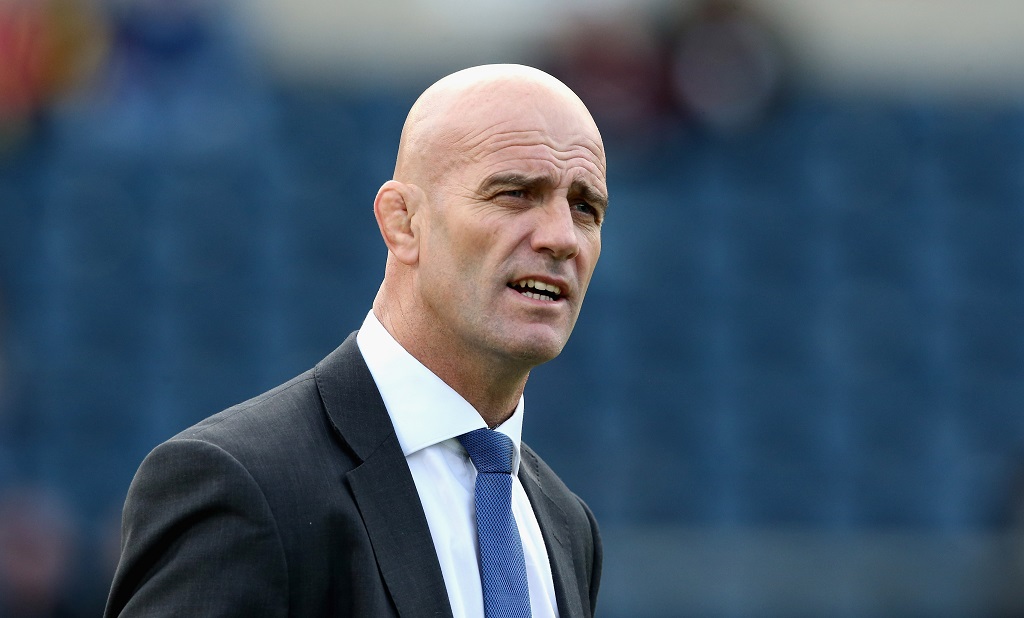Venter column: Bold move going for John Mitchell but Eddie’s got to go for broke

HIGH WYCOMBE, ENGLAND - DECEMBER 23: John Mitchell, the Sale Sharks head coach looks on during the Aviva Premiership match between London Wasps and Sale Sharks at Adams Park on December 23, 2012 in High Wycombe, England. (Photo by David Rogers/Getty Images)
By Brendan Venter
After suffering a 2-1 series defeat to South Africa in June, England coach Eddie Jones needed to do something to turn the boat around and the appointment of a senior coach to his set-up in John Mitchell is a bold move that could prove a masterstroke.
With Jones’ job potentially on the line, he couldn’t keep doing the same things and expecting different results. Jones has come up with the brilliant idea of getting Mitchell on board.
If you look at where Eddie is going as a coach with this group, I actually think it is exactly what they need to get them going again. If Eddie can figure out how to manage John, and it works, it could prove a master move because the reality is that where Eddie was going with the group wasn’t working.
England had a chance to turn their fortunes around in South Africa during the Test series and they couldn’t. Jones has evidently decided that he would much rather go down in a ball of fire than sit and wait for the inevitable to take place.
Mitchell created a very positive environment at the Bulls and, listening to the players, there was a great vibe in the team with the New Zealander at the helm. Mitchell is a changed man and he has learned to deal with people better than he did in the past.
However, critics have questioned why England would acquire Mitchell as their coach to replace Paul Gustard when the Bulls conceded the second most tries in Super Rugby this season.
A number of players did excel under Mitchell, but the irony is that the Pretoria-based outfit struggled on a defensive front and in my opinion Mitchell is a better attack coach – and he will eventually migrate to oversee the offence.
Mitchell is a typical New Zealand coach, who coaches how to find space and, in time, he will help more actively with England’s attack. Under Mitchell, the Bulls attacked with real intent, but defensively they had no idea and it was the area that cost them the most this year.
The basic principle of defence is width first and then line speed. Mitchell wanted to implement a rush defence, similar to the one utilised by John Plumtree at the Hurricanes. He ended up doing it because the Bulls’ previous defence coach – Pine Pienaar was let go.
Rush defence is an advanced system, not a starter one, and Pienaar felt it would be a bridge too far for young players that weren’t yet effective decision-makers. Defence is about more than just rushing up like headless chickens, and Pienaar was vindicated.
The challenge for Mitchell will be to replace Gustard, an amazing defence coach. Gustard has come a long way with rush defence – the new Quins head of rugby has coached it for a decade – and if anyone understands it, it’s him. In contrast, Mitchell hasn’t come a long way with rush defence. He saw the success the Hurricanes had with it and wanted to follow suit. There is a huge difference between having seen something work and actually making something work.
However, I believe Jones has another reason for appointing Mitchell – it’s not just for him to do the defence.
Jones has surrounded himself with a very inexperienced coaching group and, to my mind, Mitchell would join the England set-up not only as a defence coach, but as a sounding board to the Australian mentor. It makes sense for Jones to be able to bounce ideas off a coach of Mitchell’s level of experience. It’s always great having somebody like that to lean on and, to draw reference to my coaching career, when I took the Saracens job, I appointed Mark McCall with that exact strategy in mind.
I had worked with Mark before and I needed a head coach rather than another assistant. Jones, right, is in the same boat. Appointing Mitchell makes sense because he is experienced and has been around the block.
I don’t foresee a power struggle ensuing between Jones and Mitchell. In fairness to Eddie, a strength of his is listening to other opinions and debating various aspects of the game. Some are predicting a disaster coming with Eddie and John combining for England, but I actually think they will work well together in the same set-up. Eddie won’t be threatened by John’s presence because he is very comfortable in his own skin. The crux of the matter is that Eddie needs support.
It was fine when England were winning but when things start going wrong; you turn to your management group and say: “What do you think, boys?”.
When there is limited head coaching experience among your staff, it can prove extremely lonely at the top.